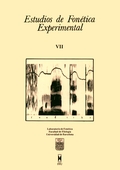[ɾ-r]: ¿Dos clases de sonidos?
Abstract
The IPA classification of [ɾ] and [r] in two different manners of articulation, known as "tap" and "trill", respectively, contrasts with the evidence that the phonological behaviour of these two sounds is homogeneous. This leads us to believe that there exists a phonetical kinship between these two sounds; that is, they are two different varieties that are part of a sole class. Among certain articulatory views, we find arguments which reject the idea of this close phonetic kinship between [ɾ] and [r] (Catford, 1977). However, there are other acoustic standpoints which defend just the opposite idea. lo our study we have found evidence in favour of the acoustic view. We relied on the results of various perceptive tests, which we obtained from editing the [ɾ] of a series of words until it sounded [r]. 94.37% of the subjects that listened to the tests accepted as good the sounds that resulted from the editing process. We also proved that these sounds consist basically of short duration occlusions (20,08 and 15,76 m.s., respectively) with a decrease in amplitude of9 and 7dB respectively.
Downloads
Published
How to Cite
Issue
Section
License

This work is licensed under a Creative Commons Attribution-NonCommercial-NoDerivatives 4.0 International License.
All articles published online by Estudios de Fonética Experimental are licensed under Creative Commons Attribution-NonCommercial-NoDerivs 4.0 International (CC BY-NC-ND 4.0 DEED), unless otherwise noted. Estudios de Fonética Experimental is an open access journal. Estudios de Fonética Experimental is hosted by RCUB (Revistes Científiques de la Universitat de Barcelona), powered by Open Journal Systems (OJS) software. The copyright is not transferred to the journal: authors hold the copyright and publishing rights without restrictions. The author is free to use and distribute pre and post-prints versions of his/her article. However, preprint versions are regarded as a work-in-progress version used as internal communication with the authors, and we prefer to share postprint versions.




